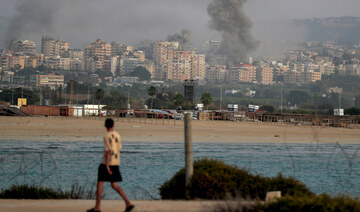HAZANO/SYRIA: Abu Mohammed lives his life in lists: He lists the places in Syria to which his family has been forcibly displaced. He lists the different reasons for each displacement. He lists the number of Muslim holidays he has spent away from home.
“When we were in our houses we had our rituals and our ambience and the joy was different,” he said, sitting in a field in the village of Hazano in the northern countryside of Idlib province, among the last territory in Syria still held by opponents of Syria’s Bashar Assad.
His house is now a tent made of blankets, taped and sewn together. Some olive groves stand nearby.
“The sweets we would put out had their own style. Today there is nothing available and we’ve forgotten this. We used to visit cemeteries before Eid prayer. Today we’ve forgotten this. We can’t reach the dead’s tomb to pray.”
Eid Al-Fitr, celebrated after the holy month of Ramadan during which Muslims fast from sunrise till sunset, is one of the main markers of the Muslim calendar, a day of family joy.
This is the eighth Eid Al-Fitr that Syria has spent at war, and the fourth that Abu Mohammed has spent away from home. His latest displacement is the fifth time he has been forced to flee as regime forces advanced. Another list: Where his family has ended up. Afrin and Azaz in northern Syria. Turkey. Europe.
“We’ve dispersed and there is no more joy in Eid.”
The last opposition-held territory in the northwest corner of Syria is home to hundreds of thousands of people who fled other parts of the country as regime forces advanced.
Last year opposition fighters and regime forces reached a demilitarization agreement there sponsored by Assad’s ally Russia and by Turkey, long an ally of the opposition.
But the Syrian regime and Russia stepped up an offensive last month on the area. Hundreds of people have been killed by shelling. Last month 270,000 people were displaced in the most intense violence for months.
Last year’s agreement envisioned a demilitarized zone in Idlib that would be free of all heavy weapons and militants. Moscow, which is keen to help Assad retake territory, has since complained about escalating violence in the area and said that fighters who used to belong to the Nusra Front, an Al-Qaeda offshoot, are in control of large tracts of territory.
Mohammed Zahed Al-Masry, a member of the Syrian NGO Alliance, said 600 civilians had died in recent weeks.
“We have 22 medical facilities that have been directly targeted. We have five markets that have been directly targeted, six centers for the White Helmets (rescue service) also have been directly targeted.”
Back among the displaced people sheltering in Hazano, Ahmad Shayhan, 38, had left everything behind and was now living in a tent with 50 people. He said new families were joining them every day. Some volunteers had thrown an Eid party for the kids.
“We haven’t seen anything like this in eight years,” he said of the celebration. “Those days are gone and will never return.”




























